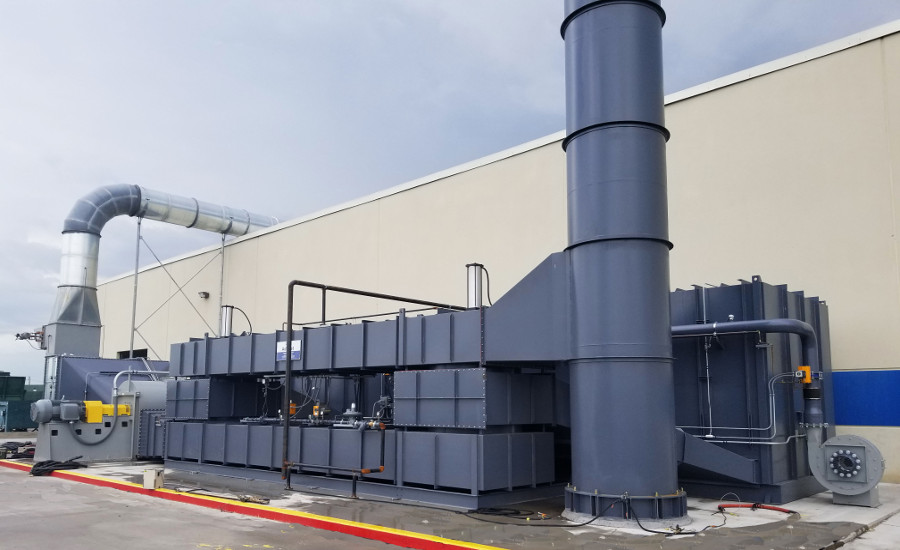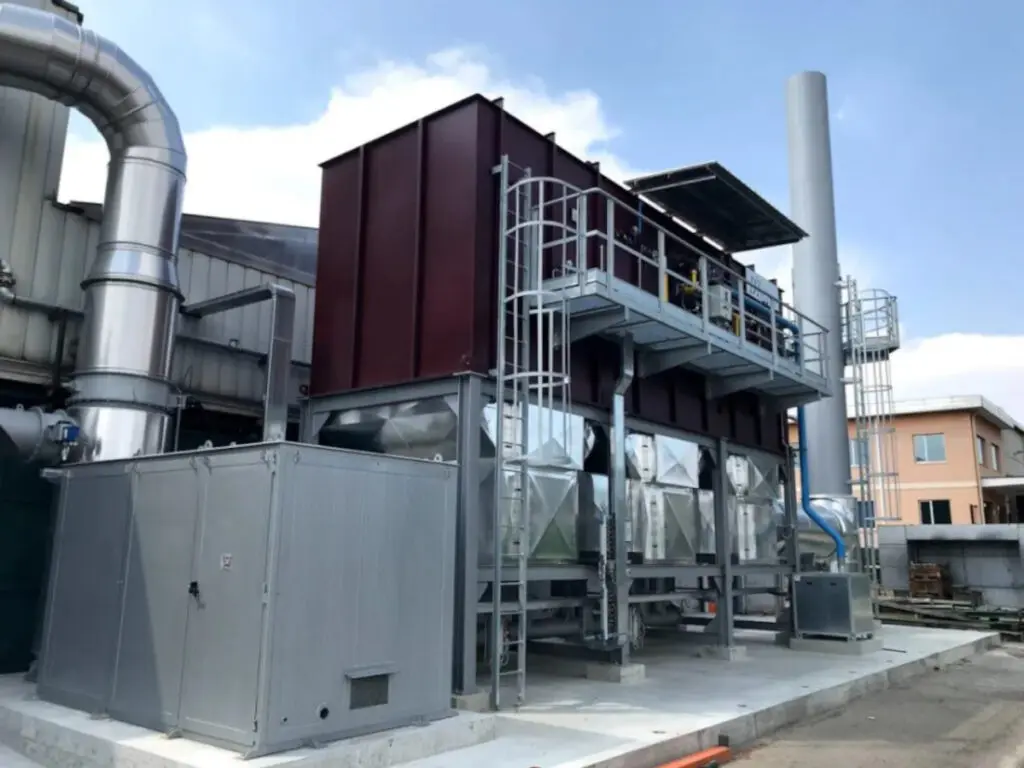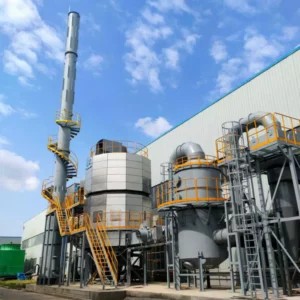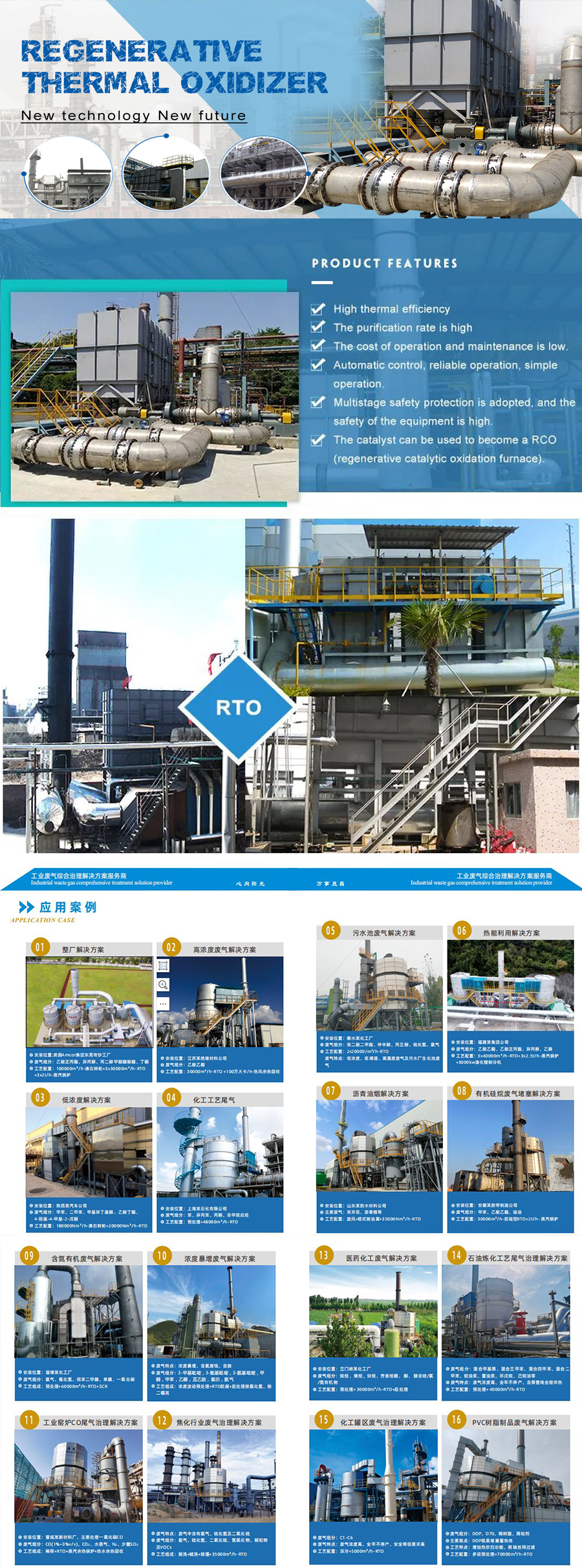Основна информация.
Модел NO.
RTO
Тип
Environmental Monitoring Instrument
Main Function
Waste Gases Removal
Application
Chemical Industry
Brand
Raidsant
Clean Efficeincy
99.8%
Condition
New
Търговска марка
Raidsant
Транспортен пакет
Film Wrapped
Произход
ZheJiang China
Описание на продукта
HangZhou Raidsant Machinery Co.;,; Ltd.; is majored in developing and manufacturing innovativepowder cooling pelletizing machinery and related industrial waste gas treatment machine.; With nearly 20 years’ production history,; we have a good market in more than 20 provinces in China,; and some of our products were exported to Saudi Arabia,;Singapore,;Mexico,; Brazil,;Spain,; America,; Russia and Korea,; etc.;
Specifications:;
* More compact than the existing facilities
* Low-operation costs
* Long lifespan of facilities
* No changes in pressure
Purpose:;
Energy-saving system that burns volatile organic compound (VOC); and waste gas by using heat,; and it collects over 99.;8% of waste heat of exhaust gas by using ceramic regenerative materials (catalyst); with large surface area and low-pressure loss.;
Applications:;
1.; Painting drying process
2.; metal printing process
3.; fiber drying process
4.; adhesive tape process
5.; waste treatment process
6.; semiconductor manufacturing process
7.; smoke,; confectionary and baking process
8.; petrochemical process,;
9.; medicine and food manufacturing process,;
10.; other VOC generating process
Merits:;
* More compact than the existing facilities
* No changes in pressure
* High-heat recovery rate (over 95%);
* Perfect VOC treatment (over 99.;8%);
* Long lifespan of facilities
* Low-operation costs
* Able to be manufactured in circle or quadrangle
General Descriptions and Features:;
1.; Operating principle
Operation method that continuously changing discharges by rotating the Rotary Valve
2.; Process Pressure Change
No pressure change because wind direction changes in order by the Rotary Valve rotation
3.; Investment Costs
Around 70% of Bed Type
4.; Installation Space
It is single vessel so it is compact and requires less installation space.;
5.; Maintenance
It is easy to maintain it because Rotary Valve is the only 1 moving part.;
Rotary Valve’s sealing part is rarely worn out because it rotates at low speed.;
6.; Stability
No risks in the process because it is always opened even when the Rotary Valve has troubles.;
7.; Treatment Efficiency
Treatment efficiency maintains because sealing part is rarely worn out even if it is operated for a long time.;
Address: No.3,Zhenxin Middle Road, Economic Development Zone,HangZhou,ZheJiang
Тип бизнес: производител/фабрика, търговска компания
Business Range: Chemicals, Electrical & Electronics, Manufacturing & Processing Machinery, Security & Protection
Management System Certification: ISO 9001
Main Products: Pelletizer, Flaker, Pastillator, Granulator, Chemical Pelletizer, Vocs
Company Introduction: HangZhou Raidsant Machinery Co., Ltd. ., previously called HangZhou Xinte Plastic Machinery Factory is majored in producing innovative plastic recycling machinery. With nearly 20 years′ experience, we have a good market in 20 provinces in China, and some of our products were exported to Indonesia, Russia and Vietnam, etc. Our main products include DZ Type Pastillator, waste tire recycling line, Big Calibre Plastic Pipe shredders recycling line, continuous annealing tin-coation machine, QX type PET, PE & hull washing line, SDP double rails plastic recycling crusher, SJ hot cutting granule making unit, PVC tube (cinquefoil) product line, PVC Odd-shaped material product line for door and window, granule product line in water and Shredder for plastics and recycling. We acquired 5 technical patents.
Our corpotation lays emphsis on thchnical reconstruction, imports advanced technology from home and abroad, and develops new products constantly. Our tenet is challenging for hight quality, offering the best products. We are making efforts to realize our slogan. Satisfying our customers is our everlasting pursuit.
We are looking for the oversea customers or agents. If you are interested in our proposal, please let us know which of our products is the most likely to appeal to you or your customers. We should be very grateful if you give us some ideas of the marketprospects for our products. We hope to hear favorable information from you soon! It is our goal that we wish we could buid a good relationship with you now or in the near future. Please do not hesitate to contact us if you have any question or request.
We also sincerely welcome you to our company to discuss business and negotiate with us. For further expanding our market and customers, our company welcomes customer from domestic and aboard in an new-brand gesture on the basis of full-new mangement conception—quality, honour, service. We are looking for ISO 90001 mangement quality system to meet with our customers requirement!

What is the difference between a regenerative thermal oxidizer and a thermal oxidizer?
A regenerative thermal oxidizer (RTO) and a thermal oxidizer are both types of air pollution control devices used for the treatment of volatile organic compounds (VOCs) and other air pollutants. While they share the same purpose, there are distinct differences between the two technologies.
Here are the key differences between a regenerative thermal oxidizer and a thermal oxidizer:
- Operating Principle: The fundamental difference lies in the operating principle. A thermal oxidizer operates by using high temperature alone to oxidize and destroy pollutants. It typically relies on a burner or other heat sources to raise the temperature of the exhaust gases to the required level for combustion. In contrast, an RTO utilizes a regenerative heat exchanger system to preheat the incoming exhaust gases by capturing and transferring heat from the outgoing gases. This heat exchange mechanism significantly improves the overall energy efficiency of the system.
- Възстановяване на топлина: Heat recovery is a distinctive feature of an RTO. The regenerative heat exchanger in an RTO allows for the recovery of a significant amount of heat from the outgoing gases. This recovered heat is then used to preheat the incoming gases, reducing the energy consumption of the system. In a typical thermal oxidizer, heat recovery is limited or absent, resulting in higher energy requirements.
- Energy Efficiency: Due to the heat recovery mechanism, RTOs are generally more energy-efficient compared to traditional thermal oxidizers. The regenerative heat exchanger in an RTO allows for thermal efficiencies of 95% or higher, meaning that a significant portion of the energy input is recovered and utilized within the system. Thermal oxidizers, on the other hand, typically have lower thermal efficiencies.
- Operating Costs: The higher energy efficiency of RTOs translates into lower operating costs over the long term. The reduced energy consumption can result in significant savings in fuel or electricity expenses compared to thermal oxidizers. However, the initial capital investment for an RTO is generally higher than that of a thermal oxidizer due to the complexity of the regenerative heat exchanger system.
- Control of Pollutant Concentrations: RTOs are better suited for handling variable pollutant concentrations compared to thermal oxidizers. The regenerative heat exchanger system in an RTO allows for better control and adjustment of operating parameters to accommodate fluctuations in pollutant concentrations. Thermal oxidizers are typically less adaptable to varying pollutant loads.
In summary, the main differences between a regenerative thermal oxidizer and a thermal oxidizer lie in the operating principle, heat recovery capabilities, energy efficiency, operating costs, and control of pollutant concentrations. RTOs offer higher energy efficiency, better control of pollutant concentrations, and lower operating costs, but they require a higher initial investment compared to traditional thermal oxidizers.

What are the typical construction materials used in regenerative thermal oxidizers?
Regenerative thermal oxidizers (RTOs) are constructed using various materials that can withstand the high temperatures, corrosive environments, and mechanical stresses encountered during operation. The choice of materials depends on factors such as the specific design, process conditions, and the types of pollutants being treated. Here are some typical construction materials used in RTOs:
- Heat Exchangers: The heat exchangers in RTOs are responsible for transferring heat from the outgoing exhaust gas to the incoming process air or gas stream. The construction materials for heat exchangers often include:
- Ceramic Media: RTOs commonly use structured ceramic media, such as ceramic monoliths or ceramic saddles. These materials have excellent thermal properties, high resistance to thermal shock, and good chemical resistance. Ceramic media provide a large surface area for efficient heat transfer.
- Metallic Media: Some RTO designs may incorporate metallic heat exchangers made from alloys such as stainless steel or other heat-resistant metals. Metallic media offer robustness and durability, particularly in applications with high mechanical stresses or corrosive environments.
- Combustion Chamber: The combustion chamber of an RTO is where the oxidation of pollutants takes place. The construction materials for the combustion chamber should be able to withstand the high temperatures and corrosive conditions. Commonly used materials include:
- Refractory Lining: RTOs often have refractory lining in the combustion chamber to provide thermal insulation and protection. Refractory materials, such as high-alumina or silicon carbide, are chosen for their high-temperature resistance and chemical stability.
- Steel or Alloys: The structural components of the combustion chamber, such as the walls, roof, and floor, are typically made of steel or heat-resistant alloys. These materials offer strength and stability while withstanding the high temperatures and corrosive gases.
- Ductwork and Piping: The ductwork and piping in an RTO transport the exhaust gas, process air, and auxiliary gases. The materials used for ductwork and piping depend on the specific requirements, but commonly used materials include:
- Mild Steel: Mild steel is often used for ductwork and piping in less corrosive environments. It provides strength and cost-effectiveness.
- Stainless Steel: In applications where corrosion resistance is crucial, stainless steel, such as 304 or 316 grades, may be used. Stainless steel offers excellent resistance to many corrosive gases and environments.
- Corrosion-Resistant Alloys: In highly corrosive environments, corrosion-resistant alloys like Hastelloy or Inconel may be employed. These materials provide exceptional resistance to a wide range of corrosive chemicals and gases.
- Insulation: Insulation materials are used to minimize heat loss from the RTO and ensure energy efficiency. Common insulation materials include:
- Ceramic Fiber: Ceramic fiber insulation offers excellent thermal resistance and low thermal conductivity. It is often used in RTOs to reduce heat loss and improve overall energy efficiency.
- Mineral Wool: Mineral wool insulation provides good thermal insulation and sound absorption properties. It is commonly used in RTOs to reduce heat loss and enhance safety.
It is important to note that the specific materials used in RTO construction may vary depending on factors such as the process requirements, temperature range, and corrosive nature of the gases being treated. Manufacturers of RTOs typically select appropriate materials based on their expertise and the specific application.

Какви са изискванията за поддръжка на регенеративен термичен окислител?
Поддържането на регенеративен термичен окислител (RTO) е от съществено значение за осигуряване на неговата оптимална производителност, дълголетие и съответствие с екологичните разпоредби. Ето някои основни изисквания за поддръжка на RTO:
- Редовни инспекции: Провеждайте рутинни проверки, за да идентифицирате всички признаци на износване, корозия или повреда на компонентите на RTO. Това включва проверка на клапани, амортисьори, вентилатори, горивни камери, топлообменници и керамични медни легла. Проверките помагат за ранно откриване на потенциални проблеми и позволяват навременни ремонти или замени.
- Почистване и подмяна на компоненти: Почистете или сменете компонентите, ако е необходимо, за да поддържате правилната функционалност. Това може да включва почистване на запушени или замърсени повърхности на топлообменника, подмяна на повредени или износени клапани и амортисьори и периодична подмяна на керамичните медни легла, ако те се развалят или замърсят.
- Мониторинг на работните параметри: Редовно наблюдавайте и записвайте работни параметри като температура, въздушен поток, разлики в налягането и газови концентрации. Отклоненията от нормалните работни диапазони могат да показват потенциални проблеми или неефективност, които изискват внимание.
- Калибриране на инструменти: Калибрирайте инструменти и сензори, използвани за наблюдение и контрол, за да осигурите точно измерване на параметри като температура, налягане и дебит. Правилното калибриране помага да се поддържа надеждна и прецизна работа на RTO.
- Почистване на системата за рекуперация на топлина: Почистете системата за възстановяване на топлината, включително повърхностите на топлообменника, за да отстраните натрупаните частици или замърсяване. Това гарантира ефективен пренос на топлина и предотвратява натрупването на отлагания, които могат да намалят производителността на RTO.
- Съответствие със стандартите за безопасност: Спазвайте стандартите за безопасност и насоките за работа с RTO. Това включва правилни процедури за блокиране/маркиране по време на дейностите по поддръжката, носенето на подходящи лични предпазни средства и спазването на протоколи за безопасност за минимизиране на рисковете за персонала и оборудването.
- Документиране и водене на записи: Поддържайте изчерпателни записи за дейностите по поддръжката, проверките, ремонтите и всички модификации, направени в RTO. Документацията помага за проследяване на историята на оборудването, помага при отстраняване на неизправности и осигурява запис за съответствие с нормативните изисквания.
Важно е да се отбележи, че специфичните изисквания за поддръжка може да варират в зависимост от препоръките на производителя на RTO, дизайна на системата, работните условия и приложимите нормативни изисквания. Следването на указанията на производителя, провеждането на редовни проверки и прилагането на проактивна програма за поддръжка, съобразена с конкретния RTO, са от решаващо значение за осигуряване на неговата надеждна работа и дълъг живот.

editor by Dream 2024-04-22
